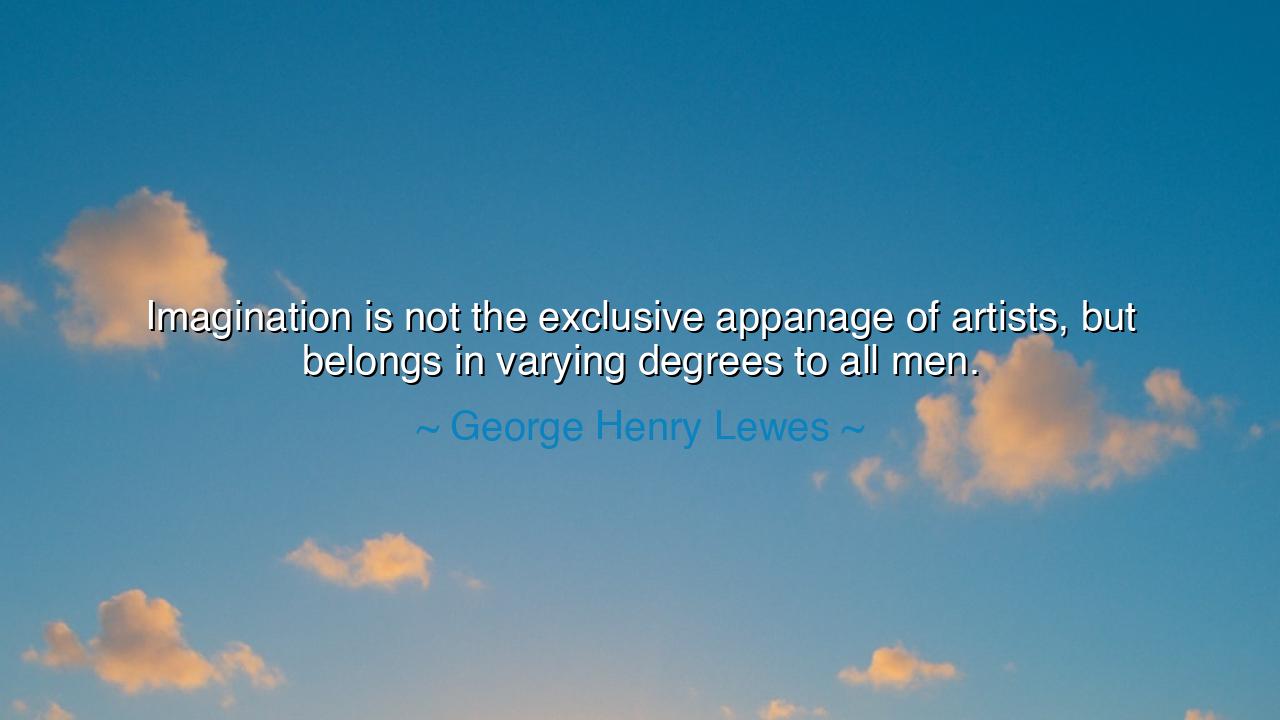
Imagination is not the exclusive appanage of artists, but belongs
Imagination is not the exclusive appanage of artists, but belongs in varying degrees to all men.






“Imagination is not the exclusive appanage of artists, but belongs in varying degrees to all men.” Thus spoke George Henry Lewes, philosopher, critic, and lover of knowledge — a man who peered into the secret machinery of human thought and saw that imagination is not a rare gift of the few, but the shared birthright of all. In this truth, he stripped away the veil that separates the so-called “artist” from the rest of humankind. For in every heart that dreams, in every mind that envisions beyond what is seen, the sacred flame of imagination burns. It is not confined to brush or pen, to stage or canvas — it dwells in every act of creation, whether humble or grand.
To the ancients, this power was divine. They named it after their gods: Prometheus, who stole fire from heaven to give it to man; Athena, who breathed wisdom into the craftsman’s hands; Hephaestus, who forged beauty from flame. Yet Lewes reminds us that this divine spark lives not only in the artist’s studio, but in the farmer’s field, the scholar’s study, the healer’s heart, and the child’s play. Wherever a human soul seeks to shape the unseen into the seen, there imagination reigns. It is the great equalizer of humanity — invisible, yet omnipresent, the eternal whisper of creation in mortal minds.
When Lewes spoke these words, he stood at the crossroads of art and science. He was a man of reason, yet also of wonder, who saw no war between knowledge and creativity. To him, the mathematician who dreams of new numbers, the inventor who envisions a flying machine, the mother who soothes her child with stories — all are artists in their own right. For imagination is not a profession, but a mode of being. It is the light that guides discovery, the force that turns thought into vision, and vision into reality.
Consider Isaac Newton, sitting beneath an apple tree, when the falling fruit stirred in him the vision of gravity. He did not see merely an apple — he saw the invisible laws binding heaven and earth. That moment was not one of logic alone, but of imagination — the power to perceive unity where others saw fragments. Or think of Marie Curie, who gazed upon minerals that glowed faintly in the dark and imagined an unseen energy that would one day change the world. They were not poets by trade, but by spirit, for imagination guided their inquiry as surely as inspiration guides the painter’s hand.
And yet, the world too often forgets this truth. We praise the artist and neglect the dreamer who never paints, the thinker who never writes. We divide humanity into creators and workers, visionaries and followers — and in doing so, we wound ourselves. Lewes reminds us that creation is the soul’s natural act, that every man and woman is endowed with the ability to imagine something greater than what is. The carpenter who dreams of a more perfect table, the physician who envisions healing, the teacher who inspires young minds — each is using the same divine faculty that built the cathedrals of art and science alike.
The imagination, however, is not merely an ornament; it is the foundation of progress and survival. Without it, there would be no compassion, for to feel another’s pain is to imagine oneself in their place. Without it, there would be no justice, for to envision fairness is to see beyond the brokenness of the present. Without it, there would be no hope, for hope itself is the act of imagining a better world. Thus, imagination is not only the artist’s tool — it is humanity’s weapon against despair, our lamp against the darkness of time.
The lesson, then, is clear: do not deny your share of the divine gift. Do not say, “I am not creative,” for to live is to create, to love is to imagine. Feed your imagination — not with distraction, but with wonder. Walk beneath the stars and ponder their silence. Read deeply, listen humbly, dream boldly. Let your work, whatever it may be, be touched by vision. For when you awaken your imagination, you awaken the essence of your humanity.
So, remember the wisdom of George Henry Lewes: imagination belongs to all. It is the golden thread that ties every mind to the eternal act of creation. To use it is to live fully; to neglect it is to wither unseen. Therefore, do not fear to dream, for every dream is a seed of reality. Plant it, nurture it, and let it grow — for through the power of imagination, even the smallest soul becomes a co-creator with the divine.






AAdministratorAdministrator
Welcome, honored guests. Please leave a comment, we will respond soon